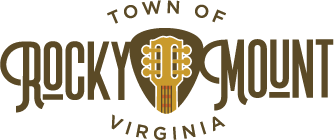Discover the Moonshine Capital of the World
In the annals of American history, Franklin County, Virginia, stands as an emblem of moonshine culture, earning its reputation as the "Moonshine Capital of the World."
Deeply rooted in the rugged terrain of the Blue Ridge Mountains, the history of moonshine in Franklin County and its county seat, Rocky Mount, traces back to the era of Prohibition. Faced with economic hardship and the imposition of alcohol bans, locals turned to illicit distillation as a means of sustenance and defiance against government regulations.
Today, the region's moonshine heritage serves as a testament to the resilience and independent spirit of its people, celebrated in museums, festivals, and the cherished traditions passed down through the ages.
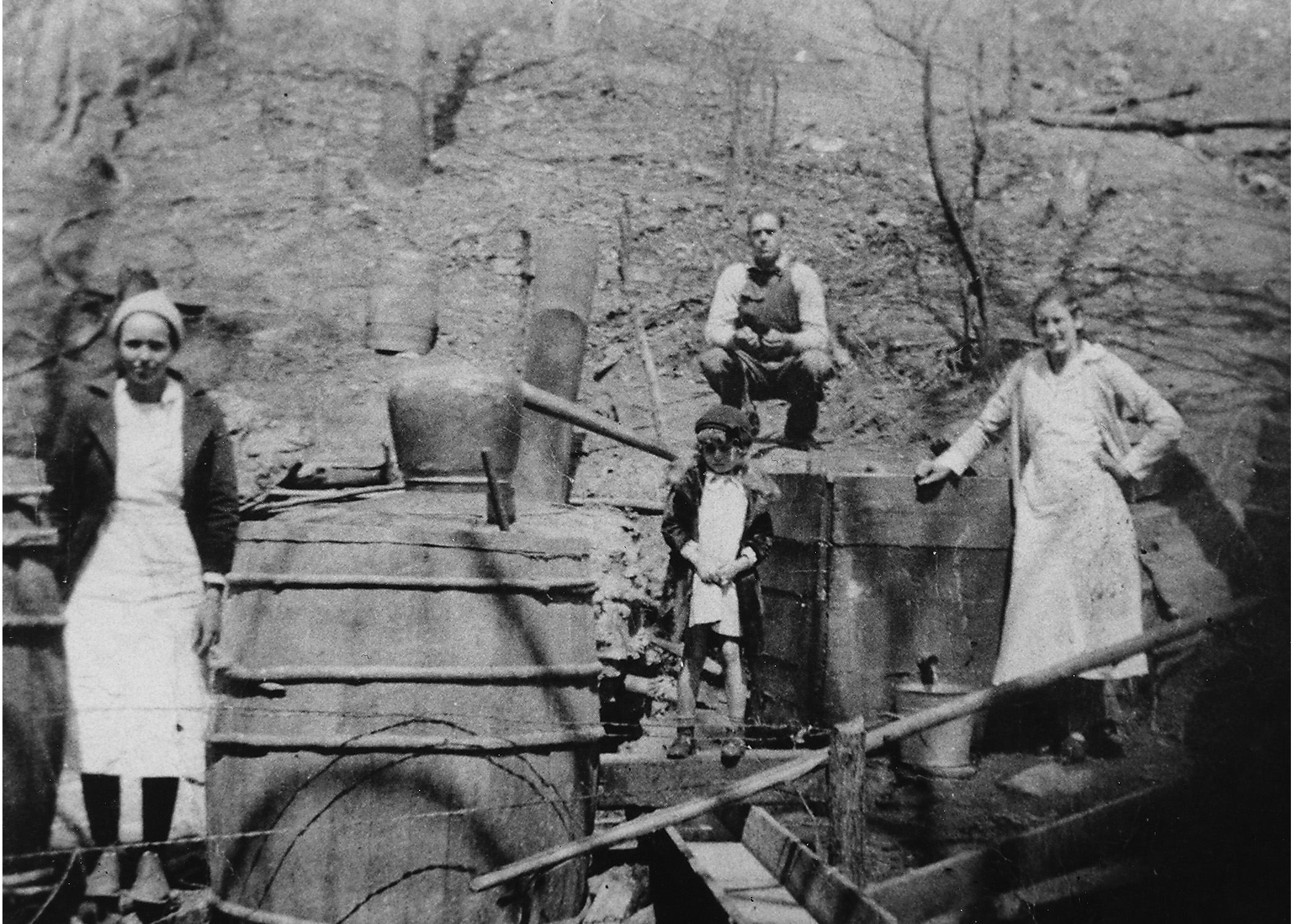
Blue Ridge Heritage Archive of Ferrum College
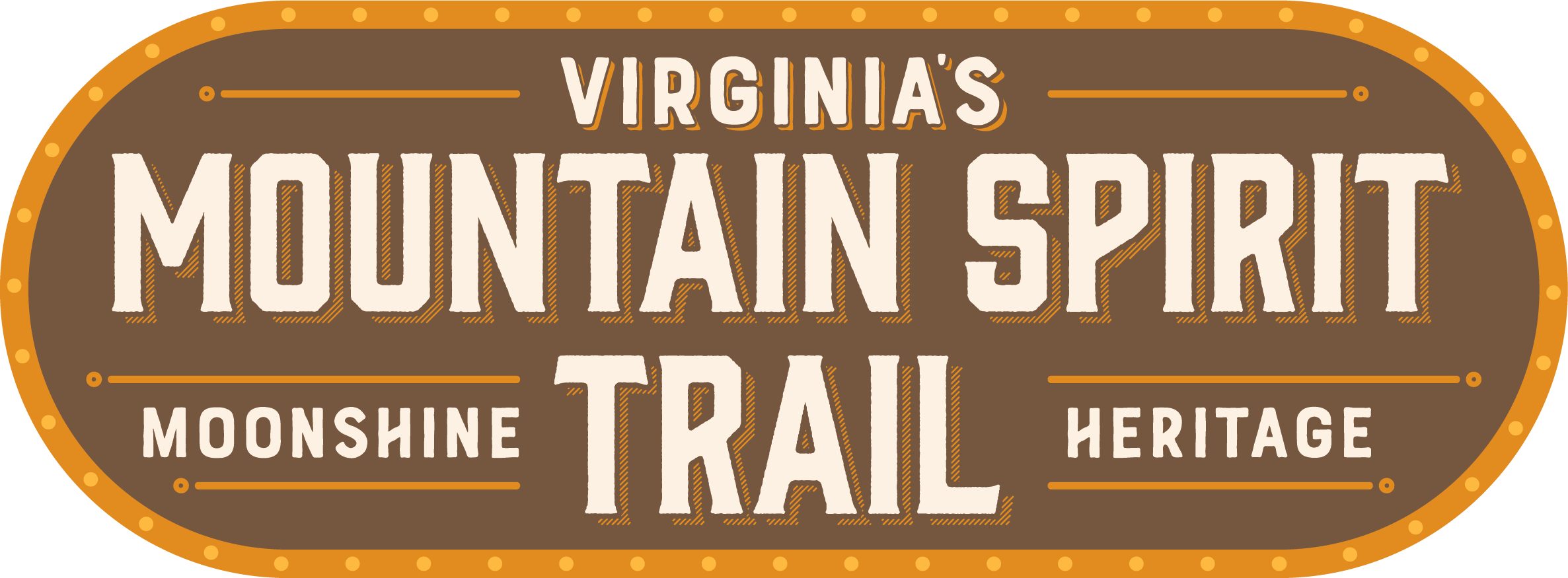
A partnership of Franklin, Floyd and Patrick counties to preserve the region's rich, shared moonshine heritage
Plan a Visit to Moonshine Country
EXPERIENCE
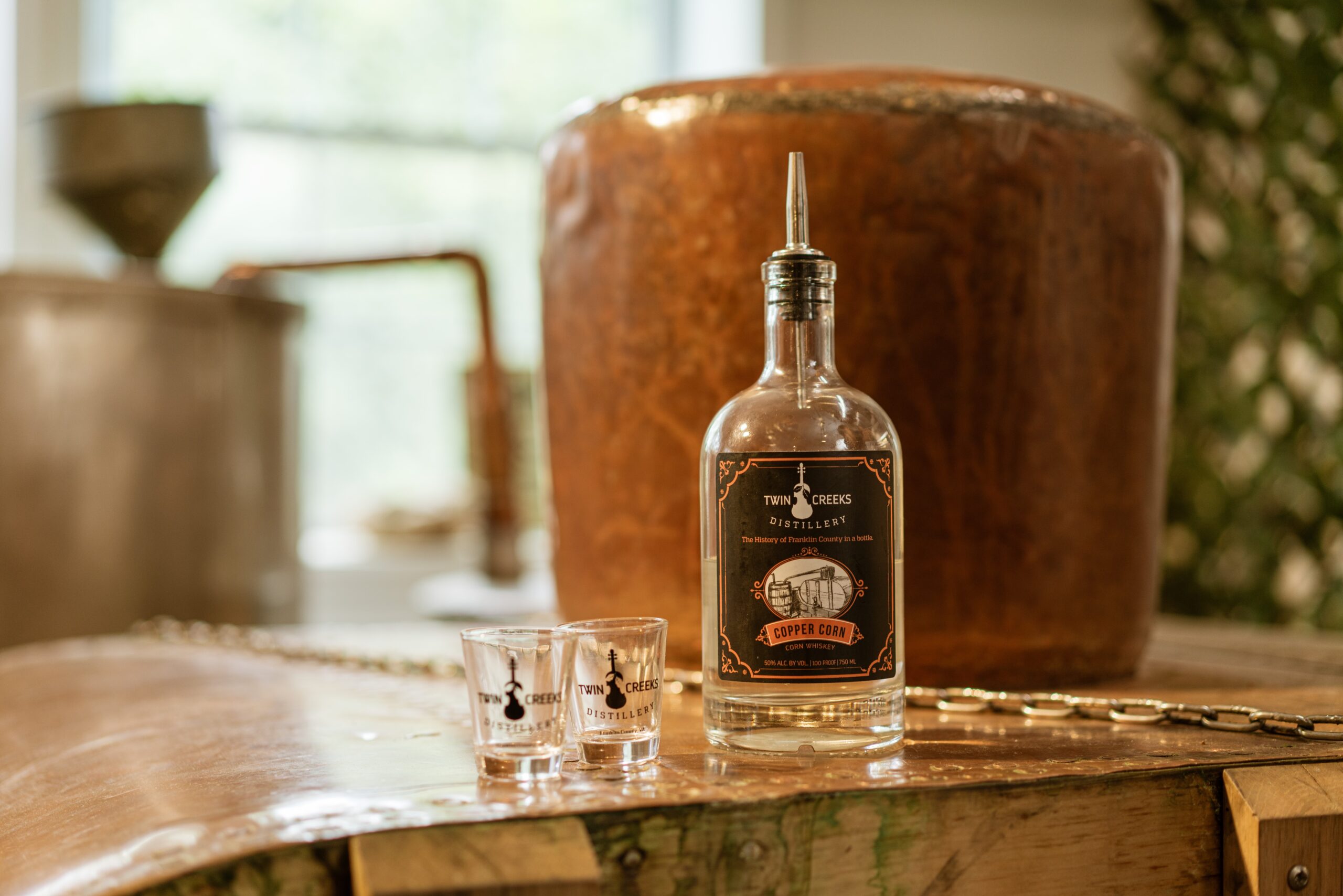
Experience the authentic taste of Appalachian tradition at Twin Creeks Distillery in downtown Rocky Mount.
Nestled in the heart of the Blue Ridge Mountains, Twin Creeks boasts a rich moonshine heritage dating back generations. The owner's grandfather, James Walter "Peg" Hatcher, played a key role in the illicit moonshine trade and was a defendant in Franklin Countys' Great Moonshine Conspiracy Trial of 1935.
Crafted with time-honored techniques and locally sourced ingredients, Twin Creeks Moonshine pays homage to the region's storied past. Plan your tasting journey and experience the spirit of Virginia's moonshine legacy.
LEARN
Moonshine Explosion Museum at Olde Towne Social House & The Alley Cat

The building that is now home to Olde Town Social House and The Alley Cat holds one of Franklin County’s most remarkable moonshine stories. In 1930, while housing Turner Motor Company, a fire sparked by leaking moonshine-laden Model T Fords sent both vehicles crashing through the garage floor, where they remained in the basement for 85 years. Decades later, as Helms Farmers Exchange, the site was linked to a major FBI investigation after purchasing over 12 million pounds of sugar — fueling an estimated 1.4 million gallons of untaxed liquor. From fiery mishaps to federal probes, this Rocky Mount landmark has long been part of moonshine history.
Franklin County Historical Society
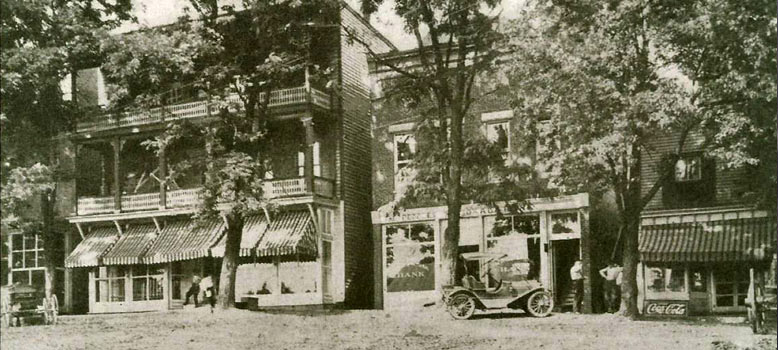
The Franklin County Virginia Historical Society Moonshine Museum offers a captivating journey into the clandestine world of moonshine production in the heart of Appalachia. Visitors are immersed in the region's storied past, discovering the ingenuity and folklore surrounding illegal distillation during Prohibition and beyond. Exhibits showcase authentic artifacts including stills, jars, and tools, shedding light on the innovative methods and colorful characters that defined the era.
THE SHINE AROUND TOWN
Anastasia's Speakeasy
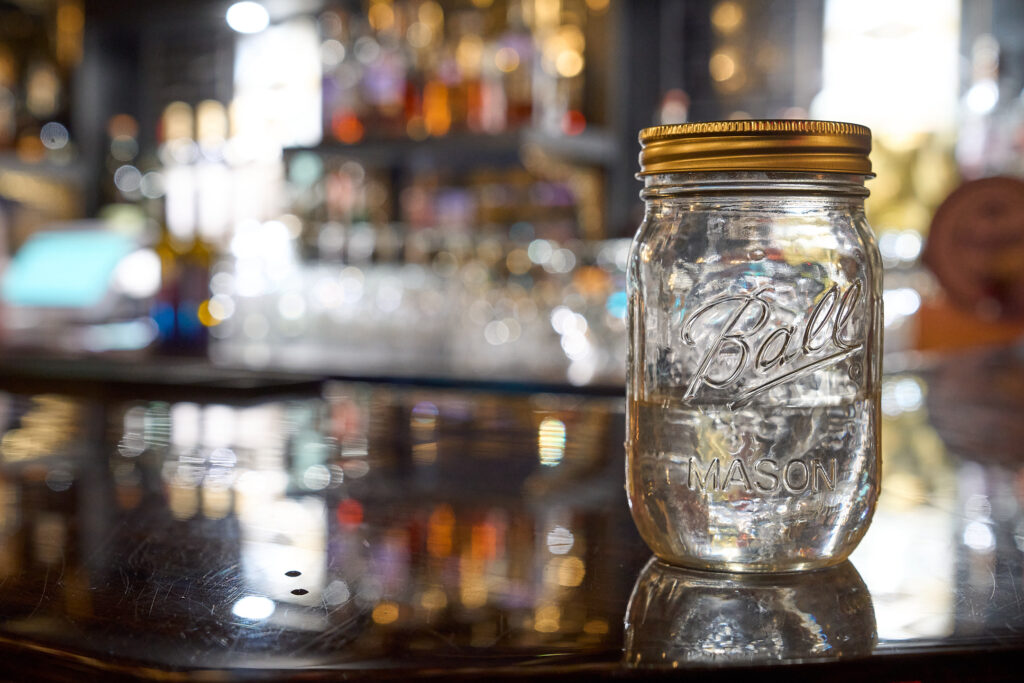
During prohibition much of the liquor made in the hills of Franklin County made its way into speakeasies in cities like New York and Chicago. Anastasia's Speakeasy harkens back to the days of illicit liquor served in back rooms. Whether it's for a meal or to taste one of the bar's rare bourbons, every taste and pour tells a story of rebellion.
Living Proof Beer Company
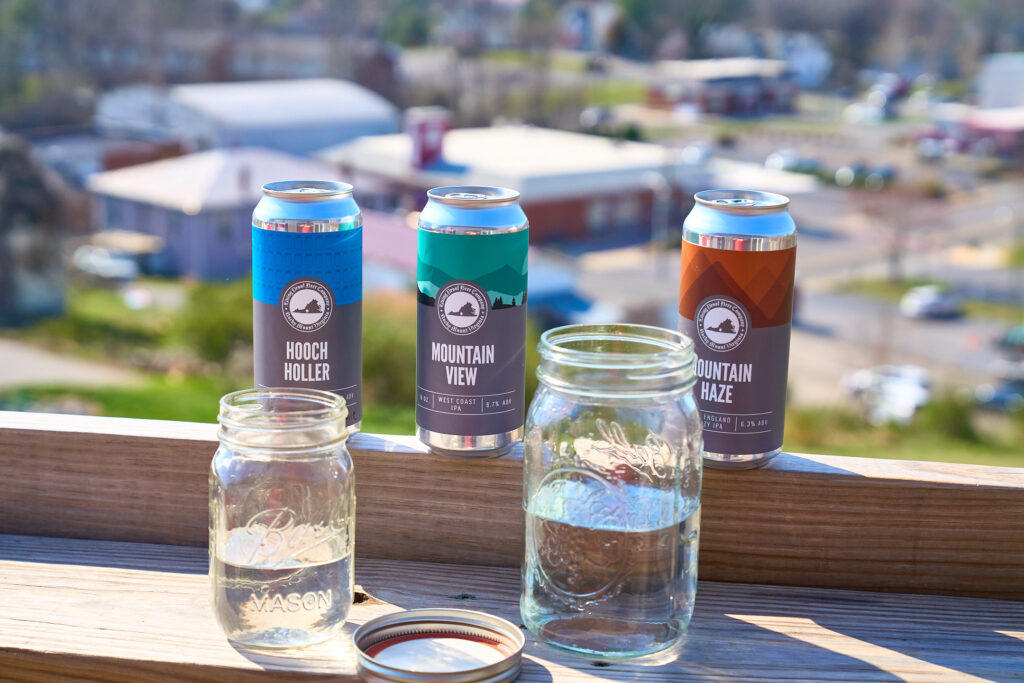
Living Proof Beer Company embodies the spirit of innovation and tradition at the heart of Appalachia. The brewery pays homage to the region's rich history, including nods to the area's legacy of moonshine distillation. With a fusion of craft beer with names such as Peckin’ the Cap, Hooch Holler, Copper Still and Granny Fee, Living Proof offers a unique experience where visitors can savor distinct flavors while immersing themselves in the vibrant heritage of the Moonshine Capital of the World. The sticker wall is signed by several of the "Moonshiners" from the popular Discovery Channel show, some of which frequent the brewery.
Rocky Mount Burger Company
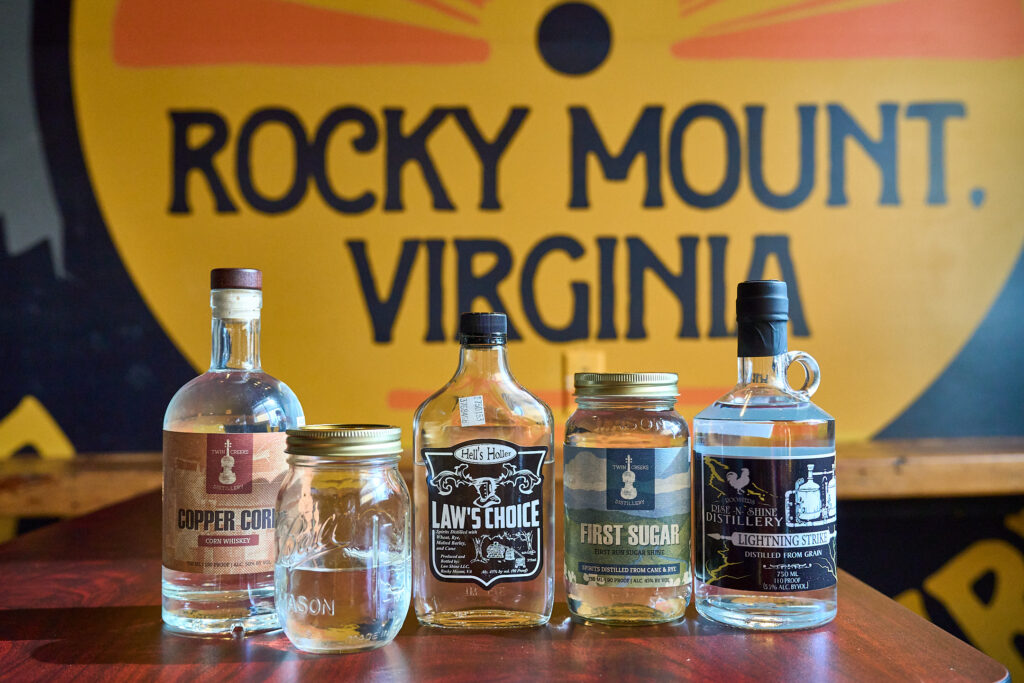
Savor the flavors of Appalachia at Rocky Mount Burger Company, where every bite tells a tale of local pride and passion. From mouthwatering burgers to handcrafted moonshine concoctions, you'll experience the authentic blend of culinary innovation and Southern hospitality that defines Rocky Mount Burger Company.
Rocky Mount Smokehouse
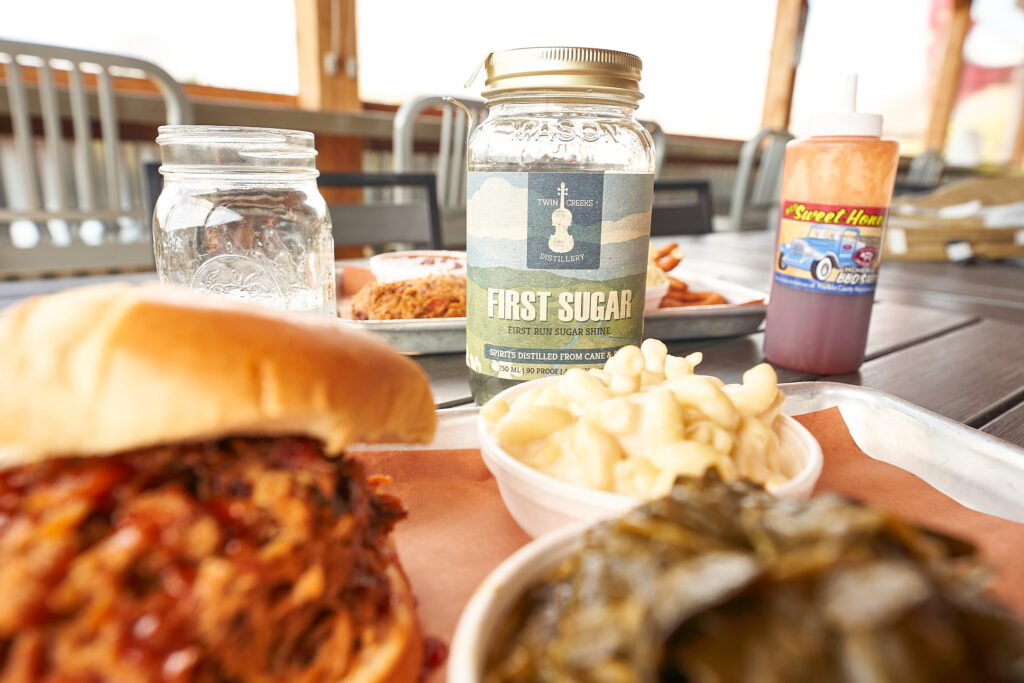
Embark on a culinary journey steeped in Appalachian tradition at Rocky Mount Smokehouse, your destination for authentic flavors and soulful dining. Indulge in mouthwatering smoked meats infused with the essence of moonshine, perfectly complemented by handcrafted moonshine cocktails and sauces. From tender brisket to savory ribs, each dish embodies the rich heritage of the Blue Ridge Mountains. We are proud to serve locally made moonshine from Rooster's Rise n' Shine, Twin Creeks Distillery, Law's Choice, and Tim Smith.
SEE MORE
Blue Ridge Institute Museum
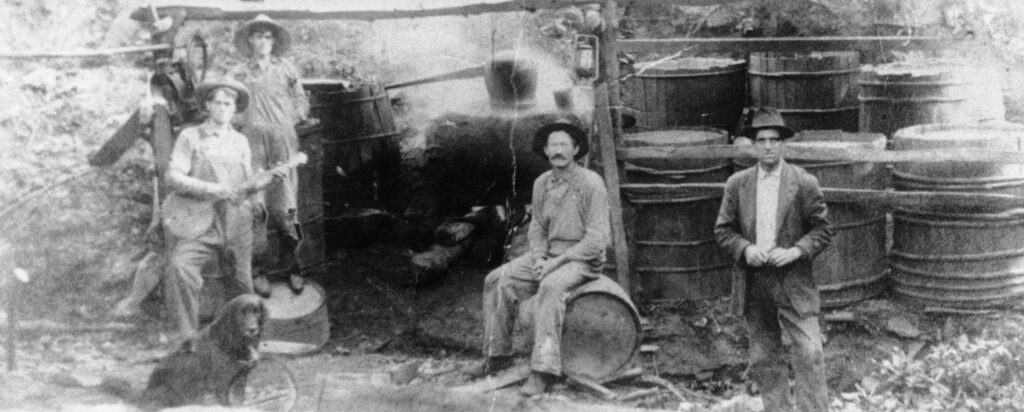
Blue Ridge Institute & Museum, created by Ferrum College, preserves the rich folk heritage of the Blue Ridge region. BRIM's exhibit Moonshine: Blue Ridge Style takes a deep dive intot he history and culture of moonshine throughout the mountains of Virginia. You'll even find an authentic recipe!
Rooster's Rise -N- Shine Distillery
With moonshine roots dating as far back as 1823, Roosters Rise -N- Shine Distillery honors the region's legacy, distilling 'shine and more using an authentic recipe from Franklin County native "Rooster" Hodges. Whether you try a flavored variety or play it straight, ever sip tells a story.
Keeping scrolling - there's more to see! Check out our map of moonshine sites around Rocky Mount, our moonshine timeline, and more!
Brief History of Moonshine in the Region
18th Century
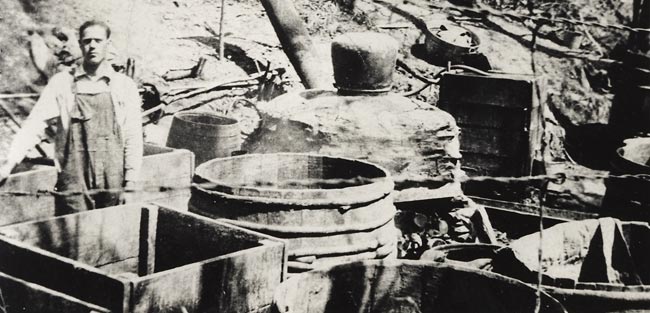
Blue Ridge Heritage Archive of Ferrum College
Long before moonshine became legend in Franklin County, the folks who settled these hills in the 1700s were already experts at turning fruit and grain into something a little stronger. The Scots-Irish, Germans, and English brought distilling traditions with them when they made their way to the backcountry of western Virginia.
Back then, life in the Blue Ridge was rugged. Roads were treacherous, markets were far away, and crops didn’t always make it in good condition — especially fruit. So farmers used what they had: copper stills, wooden barrels, and old-world knowledge. Whiskey and brandy weren’t just for sipping — they were ways to preserve harvests, earn extra income, and feed livestock with the leftover mash. You could turn a few bushels of corn or apples into high-value liquor and still have slop to fatten the hogs.
By the time the U.S. started taxing alcohol to pay off war debt, distilling was already part of daily life here. It was practical, profitable — and it tasted pretty good, too.
Late 18th-Early 20th centuries
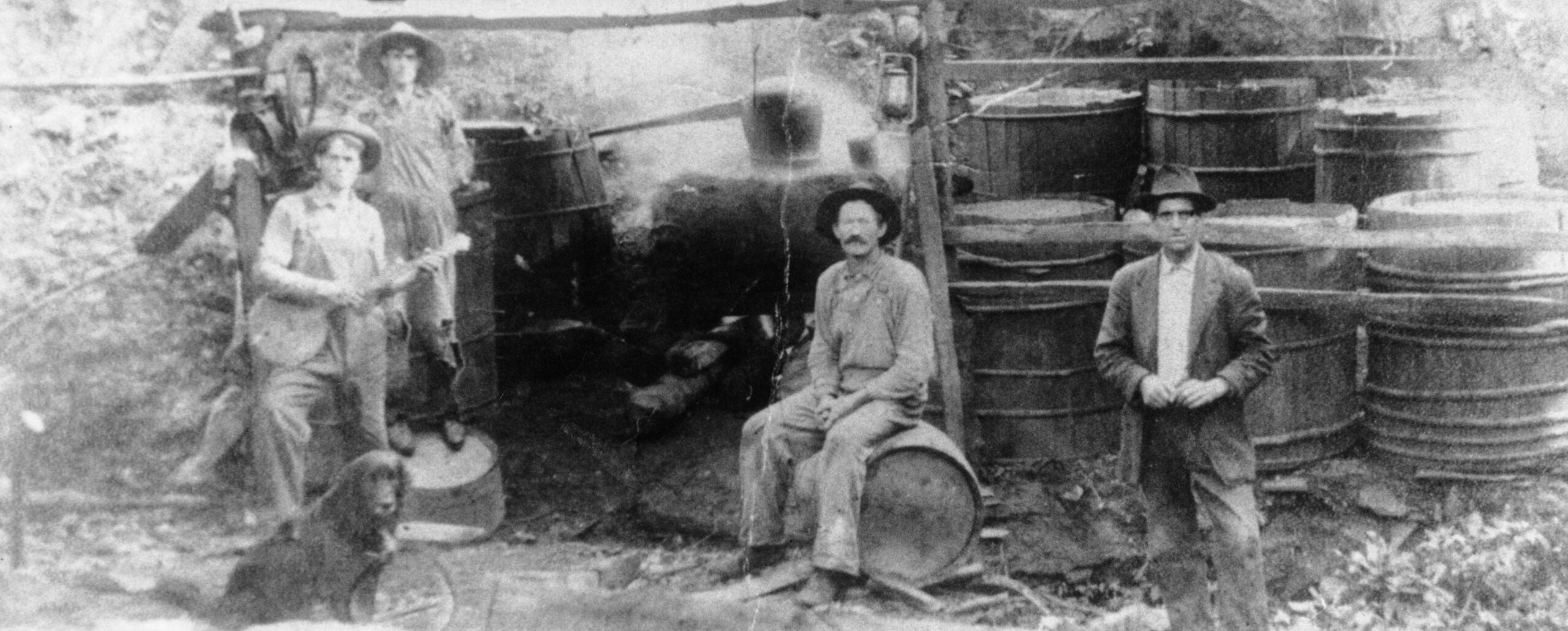
Blue Ridge Heritage Archive of Ferrum College
If there’s one thing that’s always fueled the moonshine trade in Franklin County, it’s taxes. Starting in the late 1700s, the U.S. government began collecting an exise tax on alcohol, and plenty of mountain folks decided to keep distilling off the books.
By the Civil War, federal whiskey taxes had jumped to $2 a gallon — much more than it cost to make — pushing many distillers into the shadows. Still, by the 1880s, dozens of licensed distilleries were running across the Blue Ridge, especially after apple and peach harvests. In 1893-94, Franklin County had 77 legal stills.
But by the early 1900s, the tide was turning. New laws shut down rural distilleries, and one by one, Virginia counties went dry — though Franklin County kept voting “no” on the bans. When national Prohibition hit in 1920, moonshine wasn’t just a tradition anymore — it was big business. Local bootleggers made serious money, even flying planes to scout hidden still sites.
And the hustle? It never really stopped.
1916-1933
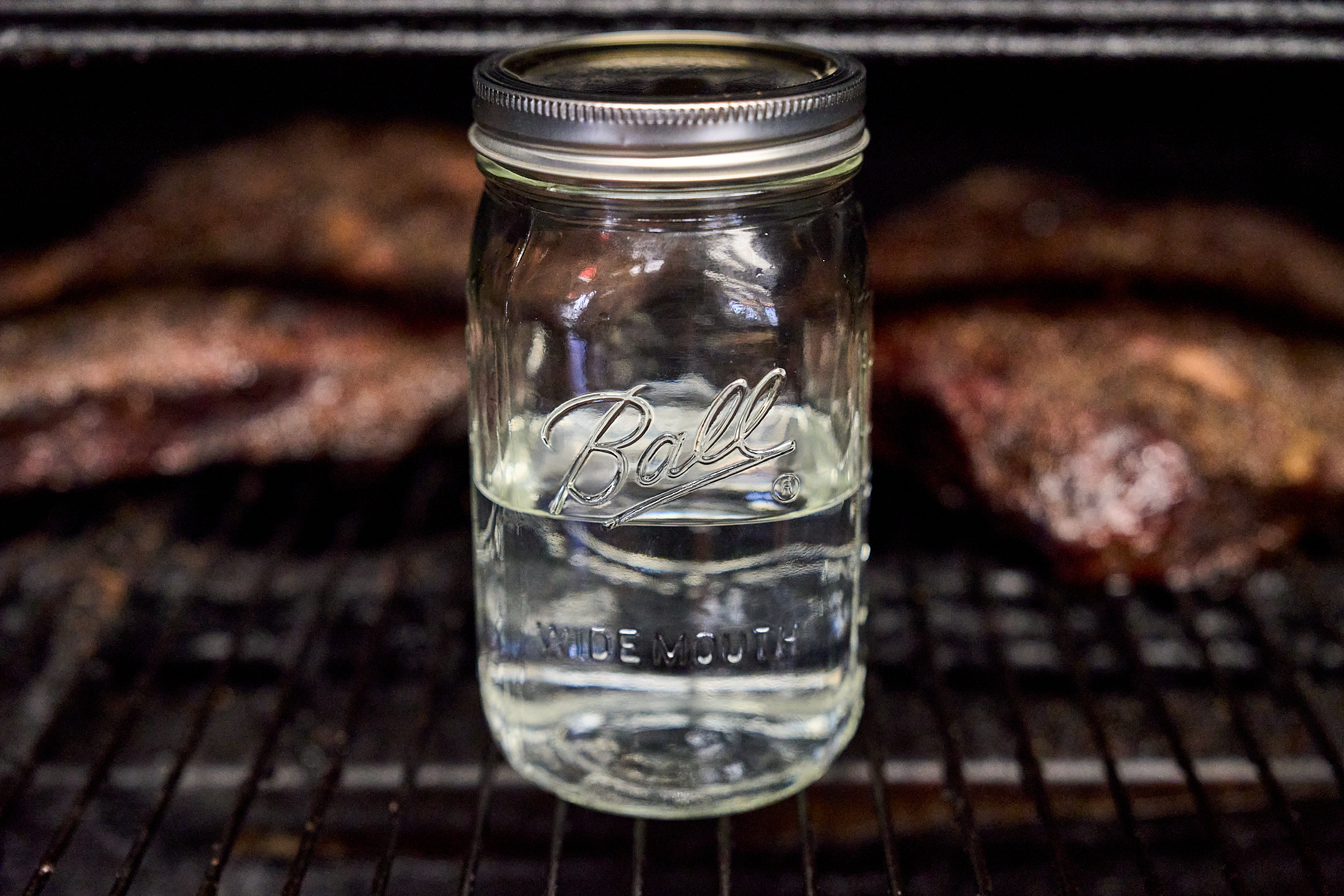
By 1914, Virginia had gone dry — and six years later, so did the rest of the country. But in Franklin County, that didn’t stop the stills from bubbling. In fact, Prohibition kicked the moonshine industry into high gear. With legal liquor off the table, local bootleggers found themselves in the middle of a full-blown underground economy stretching all the way to Roanoke, Philadelphia, and even New York City.
What started with wood-fired stills beside mountain streams evolved quickly. Farmers, millers, orchard owners, coopers, drivers, and financial backers all had a part to play. As the demand grew, so did the size of operations — and the stills. By World War I, new submarine-style stills could pump out more liquor than ever, and cars and trucks replaced wagons as the hauler’s tool of choice.
During sugar rationing in World War II, moonshiners adapted again, turning to molasses and canning jars — a now-iconic symbol of backwoods whiskey. “Nip joints” popped up in towns and hollers alike, but the real money still flowed to the cities.
Even after Prohibition ended in 1933, the business kept booming — quiet, profitable, and deeply woven into the hills of Franklin County.
1930
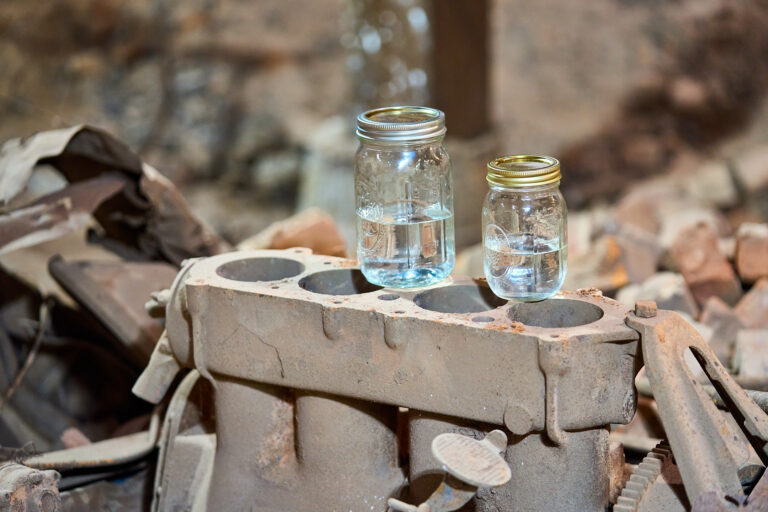
The building that now houses Olde Town Social House has one of the wildest moonshine stories in Franklin County — and that’s saying something.
Back in 1930, the buliding was home to the Turner Motor Company, a local car dealership. On a summer day that July, two employees cranked up a pair of Model T Fords — both loaded with moonshine — and stepped across the street while the engines warmed up.
As fate would have it, one of the cars had a leaking fuel pump, and within minutes, flames engulfed the garage. The fire weakened the wooden floor, and both Model Ts crashed through into the basement, landing upside down and still ablaze. The building was repaired, but the burned-out cars? They were left exactly where they landed — untouched for 85 years.
Later, as Helms Farmers Exchange, the building found itself at the center of an FBI probe. The owners had bought over 12 million pounds of sugar — second only to Hershey’s — fueling an estimated 1.4 million gallons of illegal liquor.
Turns out, this little corner of Rocky Mount has been moonshine-famous for nearly a century.
1935
By the 1930s, moonshining in Franklin County had grown into a full-blown underground empire — and the feds were paying attention. In 1935, the so-called Great Moonshine Conspiracy Trial threw Rocky Mount and Franklin County into the national spotlight, exposing a complex system of bribery, protection payments, and political corruption.
Despite countless busts during Prohibition, moonshine operations thrived. Local officials were taking “granny fees” — protection money — from distillers, and even the county sheriff was in on it. Between 1930 and 1935, illegal whiskey that passed through Franklin County could have generated $5.5 million in federal excise taxes (that’s nearly $100 million today).
After going undercover, federal agent Colonel Thomas Bailey built a case against 80 people — moonshiners, government officials, even a corporation. The trial included 68 criminal counts and 176 witnesses. It was the second-longest trial in Virginia history, filled with drama: jury tampering, threats, and even murder. One key witness — the sheriff’s treasurer — was gunned down in his car.
Thirty-one people were convicted, though most walked away with light sentences or probation. The industry barely flinched. And when parts of the trial records vanished decades later, the legend only grew.
To this day, locals still debate who was guilty — and who got away clean.
2001
By the late 1990s, Franklin County’s moonshine legend was alive and well — and still making waves.
To respond, authorities launched a joint federal-state effort — Operation Lightning Strike — to crack down on illegal liquor.
Agents tracked their target — a well-known local businessman named Jody Alton “Duck” Smith — from across dirt roads and wooded hollers near Rocky Mount. They couldn’t turn on lights or engines becausae the moonshiners were watching, too. Surveillance cameras were hidden on both sides of the law.
The raid came in 2006. Federal agents and Virginia ABC officers stormed a barn near a wildlife preserve and uncovered a massive operation: four large stills, nearly 2,000 one-gallon jugs, and over 600 pounds of sugar and grain. Authorities said it wasn’t some backwoods setup for sipping on the porch — it was a commercial-scale pipeline moving liquor from Virginia to cities as far away as Philadelphia.
Smith and five others were indicted. Agents said the operation pulled in more than $6,000 a week and ran like a drug ring, with still hands, haulers, and big-city buyers. Locals were divided, some calling Smith a crook — others supporting him.
Whatever your view, one thing is clear: Moonshine is more than history in Franklin County — it’s a culture and a heritage.
2011-present
Franklin County’s moonshine legacy even made it to reality TV. The hit Discovery Channel series "Moonshiners" features the Law family, longtime residents of the county and proud keepers of the tradition. The show highlights the challenges, risks, and deep cultural roots of moonshining in the Blue Ridge, proving that the spirit of ‘shine is still alive in Franklin County.
2012
Franklin County’s moonshine past hit the big screen with "Lawless," the 2012 film based on true events during Prohibition. Set in the hills of southwest Virginia, the movie tells the story of the Bondurant brothers, bootleggers who defied corrupt lawmen and built a liquor empire. While the film takes some creative liberties, it’s inspired by real Franklin County history and the violent tensions that surrounded the illegal whiskey trade. With its gritty storytelling and star-studded cast, the film brought national attention to the legends — and the legacy — of the Moonshine Capital of the World.
Learn More
Stay Up to Date
Sign up to receive the latest news about Moonshine culture and events in Rocky Mount!
"*" indicates required fields
